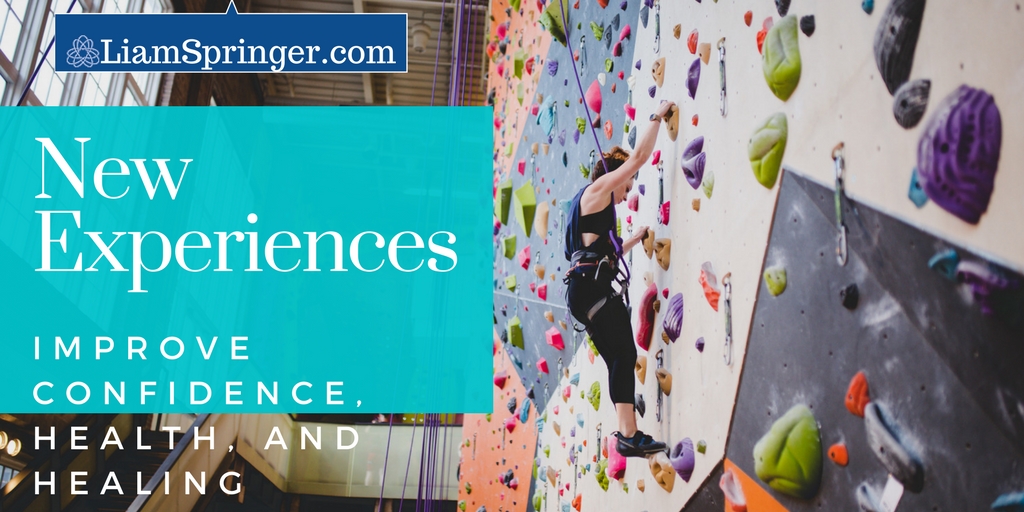
Why seek out new sights, sounds, tastes, smells, and moments? Novel experiences are not only fun and memorable. They’re also shown to have a tremendous positive impact on health and healing. That’s right—scientific evidence supports the idea that new experiences like traveling to a new city, learning a new sport, exploring a museum exhibit, or trying a new type of food are good for your health. Keep reading to learn about the physical, psychological, and all-around benefits of getting out and trying new things.
The act of exploring the environment in new, engaging, and creative ways can bring a state of healing to the mind, body, and whole being.
What Are the Specific Health Benefits of New Experiences?
Intuitively, it makes sense that new experiences are good for you; they can help you “get out of a rut” or “break out of your shell.” But what are the scientifically supported health benefits? Studies have shown that interacting with your environment in new and stimulating ways can help boost confidence and protect against a wide range of disorders. Specifically, novel experiences that are perceived as being positive and successful have the potential to:
- Enhance brain plasticity, cognitive function, and learning1
- Increase self-confidence2
- Reduce anxiety and depression3
- Reduce genetic aging and neurodegenerative disease4
- Aid in the prevention and treatment of eating disorders and drug addictions5,6
In this study, for example, rat subjects placed in enriched environments (cages that offer opportunities for novel exploration, cognitive stimulation, low-stress social interaction, physical exercise, and entertaining activities) had higher brain plasticity and reduced cognitive impairment compared to control subjects placed in conventional cages.1
What Is Environmental Enrichment?
Environmental enrichment is the act of providing opportunities for successful interactions with novel experience. Mechanisms such as new sights, sounds, tastes, smells, and tactile experiences can be used to enrich an environment. Problem solving and social interaction can be used to further accentuate the positive effects of these environmental interactions. And, finally, helping the participant discover his or her own ability to rationalize imagined dangers and carry out difficult or “impossible” actions with success is a tremendous accelerator of successfully engaging challenges.
Environmental enrichment is shown to have a fundamental role in the prevention of disease onset and increased recovery from syndromes of dysfunction across a broad range of systems.
Where Can I Experience an Enriched Environment?
BTMA Adventures is a series of community events that put environmental enrichment into action. For example, at a recent event here in St. Louis, we explored the colorful and exciting environment of the Climb So iLL rock-climbing wall. Participants challenged their bodies by opposing gravity, challenged their minds by solving puzzles posed in the rock wall course, and faced the fear of falling with the confidence of safety harnesses. And to top it off, everyone who participated enjoyed the benefits of fun and friendly social interaction.
The next BTMA Adventure is coming soon! Visit BTMAStudios.com for the latest event info.
Pro Tip: A high-quality diet can boost your mood and help you feel inspired, motivated, and ready to enjoy new experiences. Check out my previous post to learn more.
Want to try a new exercise method that’s great for posture, strength and stability, and flexibility? Visit BTMAStudios.com to register for ELDOA group classes. Want more insights on the latest topics in health and nutrition? Sign up for my monthly newsletter.
References
- Fares RP, Belmeguenai A, Sanchez PE, et al. Standardized environmental enrichment supports enhanced brain plasticity in healthy rats and prevents cognitive impairment in epileptic rats. PLoS One 8, No. 1 (Jan 2013): e53888. https://www.ncbi.nlm.nih.gov/pmc/articles/PMC3544705/
- Rosenbaum M, Ben-Ari K. Learned helplessness and learned resourcefulness: effects of noncontingent success and failure on individuals differing in self-control skills. J Pers Soc Psychol 48, No. 1 (Jan 1985): 198-215. https://www.ncbi.nlm.nih.gov/pubmed/3981388
- Grippo AJ, Ihm E, Wardwell J, et al. The effects of environmental enrichment on depressive- and anxiety-relevant behaviors in socially isolated prairie voles. Psychosom Med 76, No. 4 (May 2014): 277-284. https://www.ncbi.nlm.nih.gov/pmc/articles/PMC4020982/
- Patel TR. Environmental enrichment: aging and memory. Yale J Biol Med 85, No. 4 (Dec 2012): 491-500. https://www.ncbi.nlm.nih.gov/pmc/articles/PMC3516891/
- Grimm JW, Osincup D, Wells B, et al. Environmental enrichment attenuates cue-induced reinstatement of sucrose seeking in rats. Behav Pharmacol 19, No. 8 (Dec 2008): 777-785. https://www.ncbi.nlm.nih.gov/pmc/articles/PMC2880547/
- Puhl MD, Blum JS, Acosta-Torres S, Grigson PS. Environmental enrichment protects against the acquisition of cocaine self-administration in adult male rats, but does not eliminate avoidance of a drug-associated saccharin cue. Behav Pharmacol 23, No. 1 (Feb 2012): 43-53. https://www.ncbi.nlm.nih.gov/pubmed/22157144







2 Comments